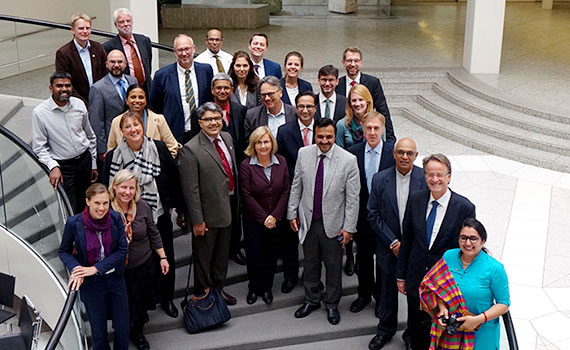iMOVE at the German-Indian working group on vocational education and training

On 24th October 2017, the Federal Institute for Vocational Education and Training (BIBB) hosted the tenth meeting of the German-Indian vocational education and training (VET) working group. The meeting was preceded by a technical meeting which took place the day before.
The meeting of the working group was led by Volker Rieke, head of department at the Federal Ministry of Education and Research (BMBF), and Dr. K. P. Krishnan, Secretary at the Indian Ministry of Skills Development and Entrepreneurship (MSDE).
In addition to the MSDE, representatives of the National Skill Development Corporation (NSDC) and the Indian Embassy in Berlin were also present on the Indian side.
For Germany, the following institutions were represented in addition to the BMBF:
- BIBB by iMOVE and the German Office for International Cooperation in Vocational Education and Training (GOVET)
- Foreign Office (AA)
- Federal Ministry for Economic Affairs and Energy (BMWi)
- Federal Ministry of Economic Cooperation and Development (BMZ) and the German Agency for International Cooperation (GIZ)
- German Central Association of Skilled Trades (ZDH)
- German Chambers of Industry and Commerce (DHIK)
- Don Bosco
- Cologne University
- Training and Development Centres of the Bavarian Employers' Associations (bfz)
India continues to hope for German support in the development of vocational education and training
In the meeting, the Indian side very clearly set out the three most urgent challenges for Indian vocational education and training.
- India quickly needs to create a large number of training opportunities.
- The quality of training in India urgently needs to improve.
- Vocational education and training must be enhanced so that young Indians perceive it as an aspirational career path.
Key tasks remain the expansion and enhancement of the training system. To support this, the Indian side are hoping for German support.
The leaders of the German delegation emphasized the five core elements of dual vocational education and training. They underlined the fact that contributions were to be expected from the German side primarily in the context of these core elements, whereas Germany would not be providing support for low quality, short-term measures.
Birgit Thomann, head of department at the BIBB, welcomed those present on behalf of the BIBB’s president. Thomann introduced the organisation's research programme to the group and provided information about the opportunity for secondments in the BIBB for guest researchers. Pooja Gianchandani is currently working at the BIBB as a guest researcher from India. She provided the working group with an overview of her research findings.
Key themes in the development of vocational education and training in India
The meeting also addressed the themes of vocational education training research and curriculum development. Together with the Indian partner Central Staff Training and Research Institute (CSTARI), GOVET has already developed a process in Calcutta for developing curricula with the industry involvement. The process has been trialled on five curricular which have now also been implemented.
The Indian government is also planning to set up an "Indian BIBB" involving CSTARI and is seeking further cooperation with the BIBB to support this.
The bfz gave a status report on both projects relating to the qualification of Indian vocational education and training staff. The MSDE accepted the bid for the projects from the bfz as part of a tender conducted by iMOVE on behalf of the Indian government.
The working group meeting also discussed what the future holds regarding the two other Train-the-Trainer measures which have been running for several years and for which the MSDE has so far not accepted any bids. A final decision is expected from the Indian side before the end of this year.
The DIHK, together with its chambers of foreign trade (AHK) and the MSDE agreed on the basic principles of a joint certification at the working group meeting. This involves a process for the awarding of certificates by the National Council on Vocational Training (NCTV) and by the DIHK/AHK.
In conclusion, the MSDE specified a series of further themes on which it was keen to work in cooperation with German partners. The German side is expecting further information on this.
From the perspective of iMOVE, the tenth meeting of the German-Indian working group on vocational education and training was a very positive and goal oriented-meeting.
Train-the-Trainer
Core elements of VET
Source: iMOVE